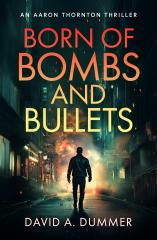
Written Literary Conversations with Nora D’Ecclesis
Featuring David A. Dummer
Born of Bombs and Bullets

Nora D’Ecclesis: Is your niche audience international travel thrillers, as exemplified in Born of Bombs and Bullets? Did personal experience inspire travel thrillers?
David A. Dummer: Yes—I knew from the moment I became an author that I wanted to focus on travel-inspired thrillers. Every place I’ve visited has an intriguing history, and those past events produced some compelling human interest stories. But I didn’t want to simply re-tell other people’s tales. So I decided to use the emotions they evoked to create wholly fictional new and entertaining stories that still reflect the countries and their histories accurately. And since I’m already a fan of the genre, I landed with the concept of travel-inspired thrillers.
Nora: In your first novel, there is a concomitant theme of generational trauma with vicarious sympathetic experience from others who also had similar trauma. Has the past violence in Northern Ireland and the Holocaust, for example, resulted in trauma and anxiety disorders?
David: In both cases, there’s evidence to suggest that’s true. There is very interesting research that indicates gene expression is altered in the descendants of Holocaust survivors, resulting in higher susceptibility to depression and anxiety, for example. And studies have found unusually high rates of PTSD, alcohol use disorder, and suicide in the Northern Irish population, which may be linked, at least partly, to The Troubles. It’s important to remember, though, that multiple factors influence positively and negatively an individual’s emotional and behavioral response to traumatic events. We also need to be mindful that behavioral health trends can vary significantly from year to year, and that’s especially true post-pandemic.
Nora: The variety of character names from the novel is so creative. How did you craft them? I particularly enjoyed the characters of Liam O’Malley, John Grace, and, of course, Rob Inglesby.
David: First, I should point out that none of the characters is based in any way on a real person. But I found it challenging to come up with names for all the characters in Born of Bombs and Bullets, so in many cases, I just combined a relative’s first name with a friend’s last name. Sometimes I took a co-worker’s middle name and made it their surname. Or I used an interesting street name that I spotted while traveling. Since the story is set mainly in Belfast, I leaned toward names that sounded Irish or English. O’Malley is one of the oldest surnames in Ireland, for example, and good friends of mine named their son Liam.
Nora: The historical fiction in this novel expertly portrays the actual geography of Georgetown University and Misery Mountain Prison. The factual reference to protocols and innovative ideas like augmentation is of interest to readers. Please tell us more.
David: I made a commitment at the outset to be as authentic as possible with my descriptions. The Georgetown campus and related details were easy, since I went to school there. But I had to research both prisons—Hazelton in West Virginia and Maghaberry in Belfast—since I never set foot in either one. That’s how I learned about Hazelton’s augmentation policy and the nickname “Misery Mountain.” I also studied publicly available manuals, photographs, descriptions, and even court cases to come up with the general layouts and conditions at both prisons, as well as the equipment and procedures in use there. Of course, some details had to come from my own imagination. But I think the fact-checkers out there will be surprised by how accurate descriptions are throughout the book. I love the idea that readers can be entertained by an entirely fictional story and still learn about real places and events along the way.
Nora: The Troubles were times of conflict in Northern Ireland from the 1960s to the 1990s. Please clarify who the various sides were, as it did not appear to break down along religious lines, but rather, Republic supporters who wanted a United Ireland vs Unionist loyalist supporters who wanted Northern Ireland to remain under United Kingdom rule.
David: This is one of the trickiest things to explain about The Troubles. The island was partitioned after the Irish War of Independence from 1919 to 1921. The newly created Northern Ireland remained under UK rule, but the rest of the island became what we now know as the Independent Republic of Ireland.
The conflict played out chiefly in Northern Ireland. There’s a tendency to think of it as Catholics versus Protestants, but it wasn’t a religious conflict per se. At its core, it was a political disagreement, centered around national identity, about whether Northern Ireland should rejoin the rest of Ireland or remain partitioned under UK rule. Loyalists, or Unionists, want Northern Ireland to be part of the UK. Generally speaking, most Protestants identify with the Loyalists/Unionists.
Republicans, or Nationalists, want Northern Ireland to be part of Ireland. Generally speaking, most Catholics identify with the Republicans/Nationalists. Consequently, Catholics and Protestants tended to find themselves on opposite sides of the violence, and the conflict is frequently described as sectarian. But it was much more complex and nuanced. In the simplest of terms, though, the disagreement was not about religious beliefs—it was about the political fate of Northern Ireland.
Nora: A recurring theme in many novels is the duplicity found in marriage. How do readers view your version of it?
David: Actually, I was surprised by the reactions to Claire’s duplicity. To avoid spoilers, I’ll just say male readers almost universally condemn Claire’s deception and side with Thornton—that’s what I expected. But female readers are split—while some do support Thornton, the majority sympathize with Claire and strongly dislike her husband’s reaction. There’s fertile ground there for book group discussion!
Nora: Do you outline as a theme or chapter before writing?
David: At the beginning, I start with a loose outline of where I think I’d like the story to go. I also write short descriptions of the main characters to give them distinct personalities in my mind. I learned early on, though, that too much structure is restrictive—I would much rather leave a lot of room for adaptation and creativity along the way. Now, as I write, I jot down prompts for myself about loose ends to tie up later, behaviors that require explanation, or plot twists that might be fun to throw into the mix. But when I sit down to write a single chapter, yes—I do list in advance each element to be addressed so I stay focused and ensure the chapter does its job succinctly and effectively. Thrillers need quick pacing, which means short, punchy chapters to move the story forward.
Nora: David, you were an Emmy-nominated Executive Producer for the movie, Voices of Strength, an amazing video that shares your professional work as a clinical therapist. Will you be interested in writing the screenplay for Born of Bombs and Bullets?
David: I think my personality and writing style are particularly well-suited to write procedural novels. But films are visual and obviously rely on more than words—you have to incorporate movement, sound, lighting, camera angles, acting, and more. It’s a very different creative process. While I would love to see the book adapted for the big screen, I’d be reluctant to attempt a screenplay on my own. I would much rather collaborate with someone more experienced and expand my skill set.
Nora: Do you plan to write a travel thriller series based on your protagonist, Aaron Thornton? Tell us about your next project.
David: I do plan to continue the series. In the next book, Thornton (in his new role!) is drawn into a high-stakes conspiracy that spans a couple of fascinating countries in different regions of the world. But readers will have to wait and see whether any of the popular, surviving characters from Born of Bombs and Bullets have a cameo. Stay tuned!
To find out more about David A. Dummer and the book Born of Bombs and Bullets, visit the websites: